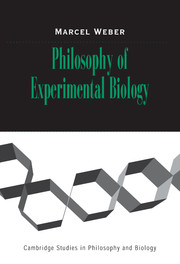Book contents
- Frontmatter
- Contents
- Preface
- Acknowledgements
- 1 Introduction
- 2 Reductionism and the Nature of Explanations
- 3 Discovery: Solving Biological Problems
- 4 Scientific Inference: Testing Hypotheses
- 5 Experimental Systems: A Life of Their Own?
- 6 Model Organisms: Of Flies and Elephants
- 7 Reference and Conceptual Change: Out of Mendel's Garden?
- 8 Developmental Biology and the Genetic Program: Explaining Ontogeny
- 9 Scientific Realism: In Search of the Truth
- Notes
- Bibliography
- Index
5 - Experimental Systems: A Life of Their Own?
Published online by Cambridge University Press: 08 July 2009
- Frontmatter
- Contents
- Preface
- Acknowledgements
- 1 Introduction
- 2 Reductionism and the Nature of Explanations
- 3 Discovery: Solving Biological Problems
- 4 Scientific Inference: Testing Hypotheses
- 5 Experimental Systems: A Life of Their Own?
- 6 Model Organisms: Of Flies and Elephants
- 7 Reference and Conceptual Change: Out of Mendel's Garden?
- 8 Developmental Biology and the Genetic Program: Explaining Ontogeny
- 9 Scientific Realism: In Search of the Truth
- Notes
- Bibliography
- Index
Summary
The philosophy of science used to be mainly occupied with scientific theories and concepts and paid very little attention to experiments. Logical empiricists, for example, placed much emphasis on the logical structure of theories and the conceptual foundations of a few selected sciences, especially theoretical physics. The focus on theories and concepts remained intact, to a large extent, even through the upheavals in the philosophy of science that have been inflicted by Thomas Kuhn and Paul Feyerabend. Anglo-American philosophy of biology, too, has largely remained within the theory-centered tradition almost up to the present; a substantial part of the work done in this area has been on evolutionary theory (see Chapter 1).
The neglect of experimentation in twentieth-century philosophy of science seems to be somewhat at odds with the fact that the two major traditions which have dominated the field – logical empiricism in North America and critical rationalism in Europe – are both thoroughly empiricist in orientation. What this means is that both of these traditions firmly hold that theoretical claims are ultimately justified by experience. Why, then, did philosophers devote so little attention to the question of how systematic experience is acquired by scientists in the laboratory or in the field? The reason is not simply negligence, but a particular view of the role of experience in science. The roots of this view lie in the traditional distinction between context of discovery and context of justification (see also the introduction to Chapter 3).
- Type
- Chapter
- Information
- Philosophy of Experimental Biology , pp. 127 - 153Publisher: Cambridge University PressPrint publication year: 2004

